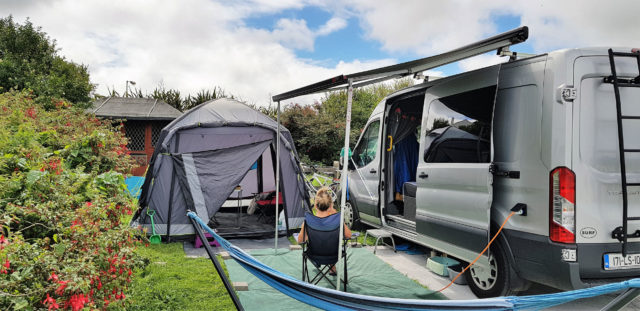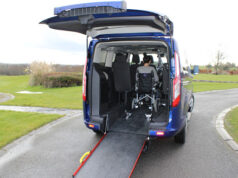Easter traditionally marks the start of the new camping season.
The evenings are longer, the weather is improving and the campsites which had been in hibernation have re-opened, spring cleaned, all bright eyed and bushy tailed for the start of the new season.
This Easter has been a godsend with scorching temperatures sending the mercury soaring, sparking a scramble for the camping gear for those who may have been sluggish or wary due to the testy temperatures and lingering storms of only a fortnight ago.
The swallows have landed. Summer is coming. The lure of the open road, the countryside and adventure beckons.
With the exception of those all-year-round sites the season is now up and running at least until late September and for many on into mid-October.
There are numerous good guides setting out the locations, tariffs and opening times of all the listed and approved camping grounds.
However, for seasoned camping enthusiasts, especially those who have splashed out on an expensive motorhome, caravan or campervan conversion, it cannot be just for Easter.
Fair weather camping is all very fine, but it makes no sense to take the plunge and purchase your own motorhome or caravan, convert your own campervan only to leave it gathering dust, or worst still moss and green mould for fifty weeks of the year.
That would just be a disaster. Forty shades of green mould, instead of forty shades of green, not to mention what a waste of forty shades of greenbacks.
If you are going to leave your motorhome parked in the drive for fifty weeks of the year, well you would be far better off just hiring one for the few weeks you need it…and pray that you get the weather.
No, a campervan conversion is not just for Easter and not for the faint hearted either. As let’s face it, last weekend’s glorious bank holiday weather is more the exception than the rule.
For a campervan conversion to work, you must really commit, virtually hail, rain or … ok, snow is optional, for the hard-core.
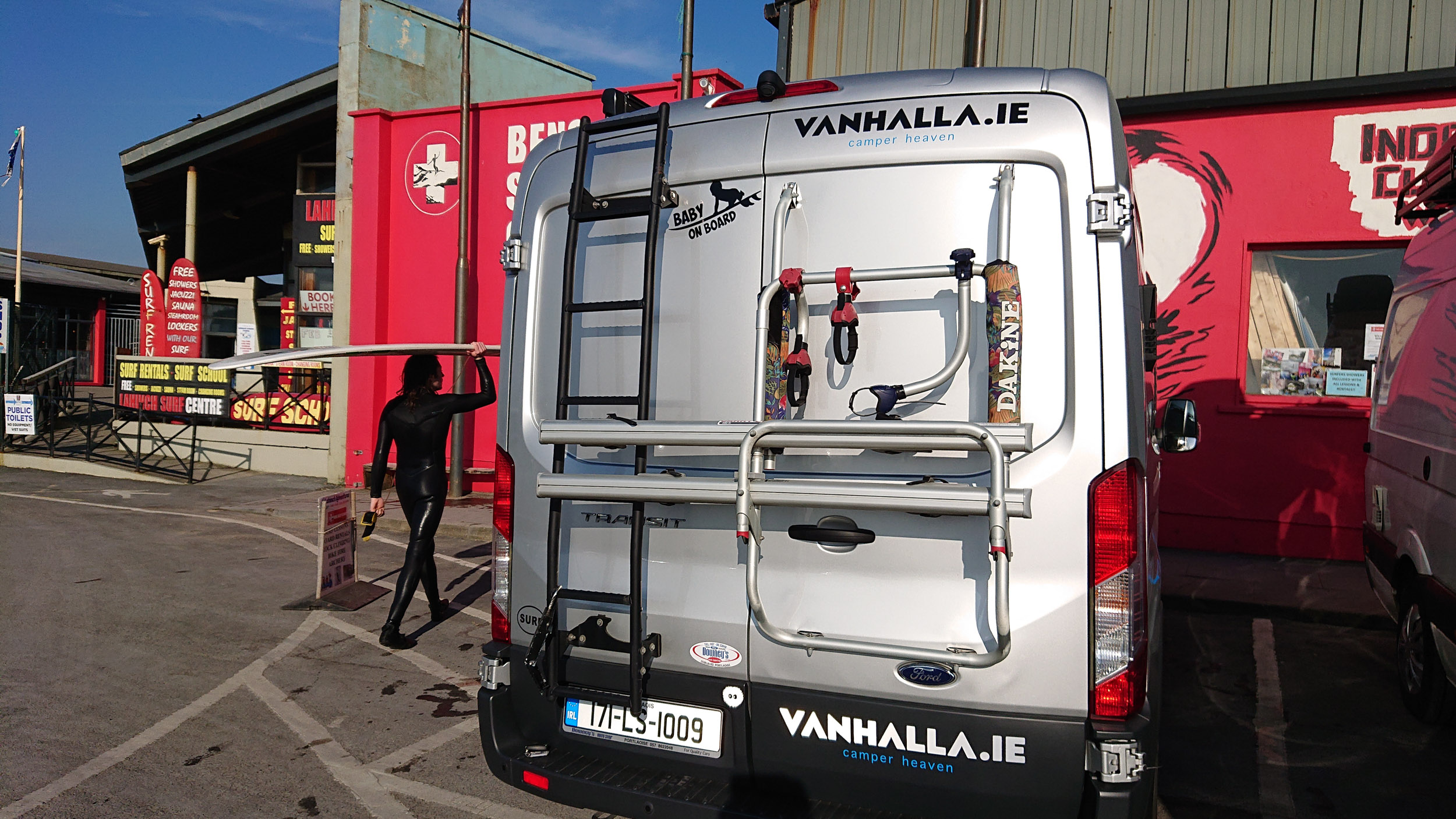
When I say commit, I don’t just mean you, but the entire family. Otherwise it will never work out so that you get the full benefit, enjoyment and return or your considerable investment.
Camping is very much a team effort. Once you enlist you must soldier; soak up the sunshine with rain; share the chores; the good experiences with the ones, best not ever mentioned again for fear of starting a third world war.
Camping is close quarters living, mostly in a confined space, especially if the weather kicks up on a pissy, misty, drizzly day in Kerry or Connemara.
You have to cancel the barbecue and baton down the hatches as even a hike, is out of the question and entertaining children another headache altogether if they can’t go outside.
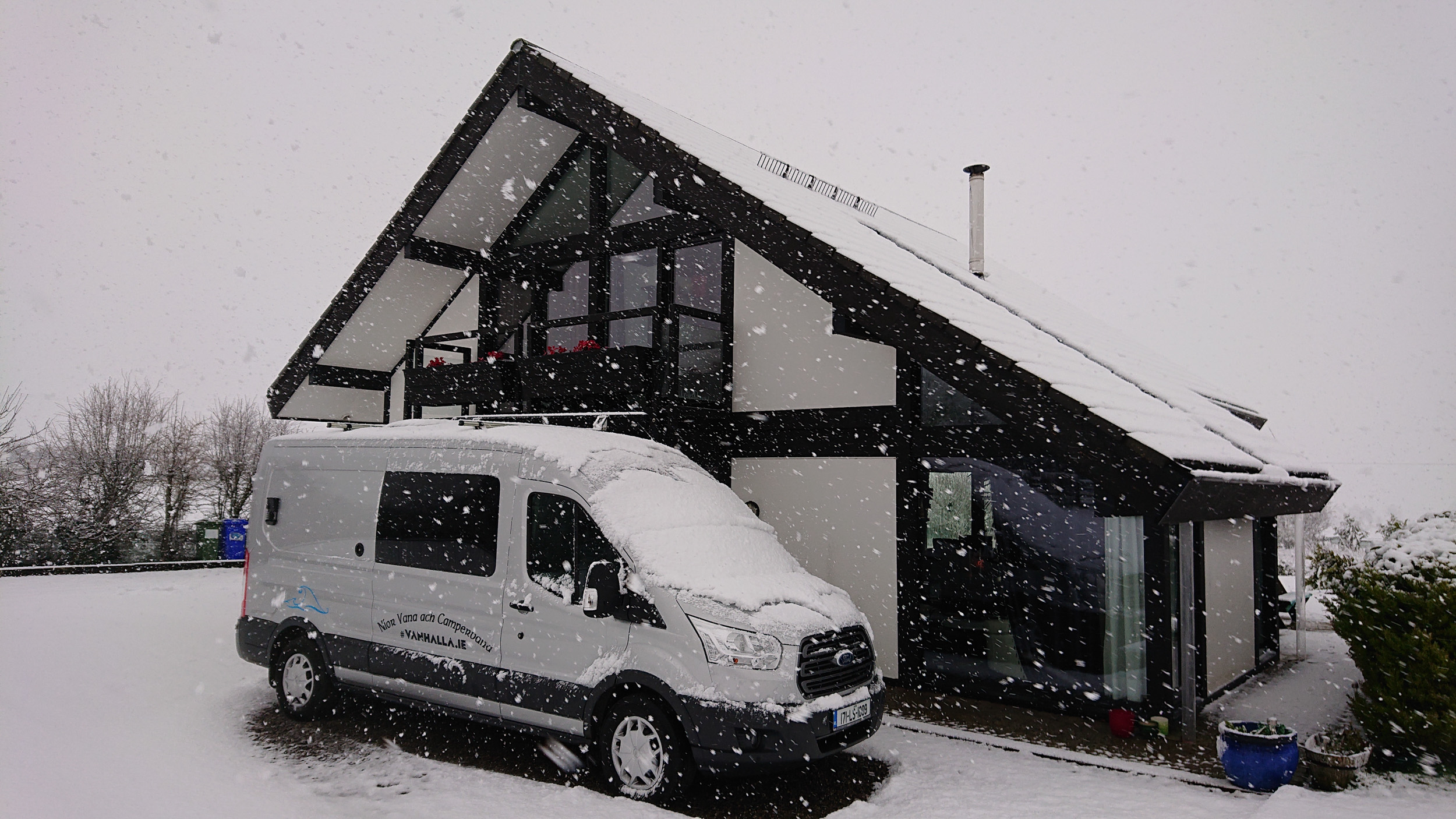
People are constantly curious once they see the campervan. Did you do it yourself? Where did you get it? How much did it cost? And I am only too glad to engage and chat about the project and their plans of one day taking the plunge and getting one of their own.
I was the exact same before we went for it. And I say we, because without Grazyna, it simply wouldn’t work on so many levels, but mostly because she is as enthusiastically into it and as committed to the camping lifestyle as myself.
Many a cold dark evening between last November and March have been spent planning and plotting routes and excursions for the new season.
Costing money when it’s parked up in your driveway
This will be our third season on the road and part of the fun and excitement is sussing out new places to go, sourcing new equipment and gadgets, repairing and maintaining our old gear, making sure the van is stocked and serviced and ready to hit the road.
Hatching plans and planning routes and stop-offs is all part of the fun, once you’re in to it.
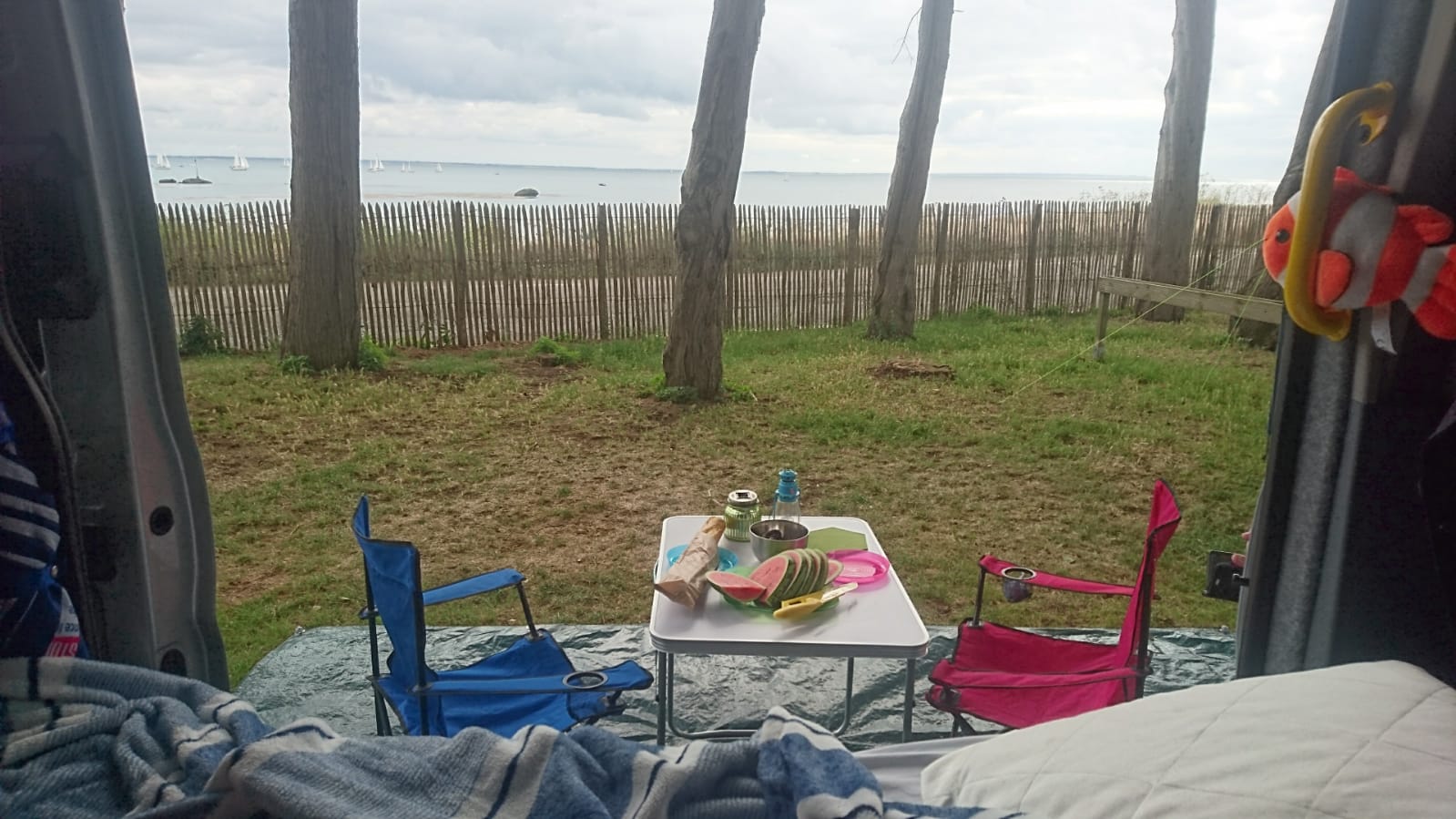
And once you’re in to it the weather doesn’t matter. A campervan is not just for Easter. It is a van for all seasons.
In hard cash terms this makes more sense too, as you get more value from your vehicle and your outlay if you can use it as much all-year-round as possible.
The fixed capital cost is the same either way. The annual cost of your road tax and insurance is the same either way, so what is the point having it parked up in the drive.
Luckily, we love surfing, being out in the wild weather, cycling the country roads, music, arts and cultural festivals and those chance encounters with events you never expected until you turn the next corner … that’s why the campervan works so well for us. We use it for the purpose it was designed and built, as much as possible.
It’s my belief that the only time a campervan is really costing you money is when it is parked up in your driveway.
So to answer that first question. No, we didn’t do it ourselves. As I can barely change a light bulb, at a push, it is fair to say that converting a van is out of my range of expertise.
The first big decision was what van, or else a second hand motorhome as the cost of a new one was out of our reach. As we were determined and dedicated to the whole idea we felt that it had to be at least a ten year or indeed a lifelong commitment.
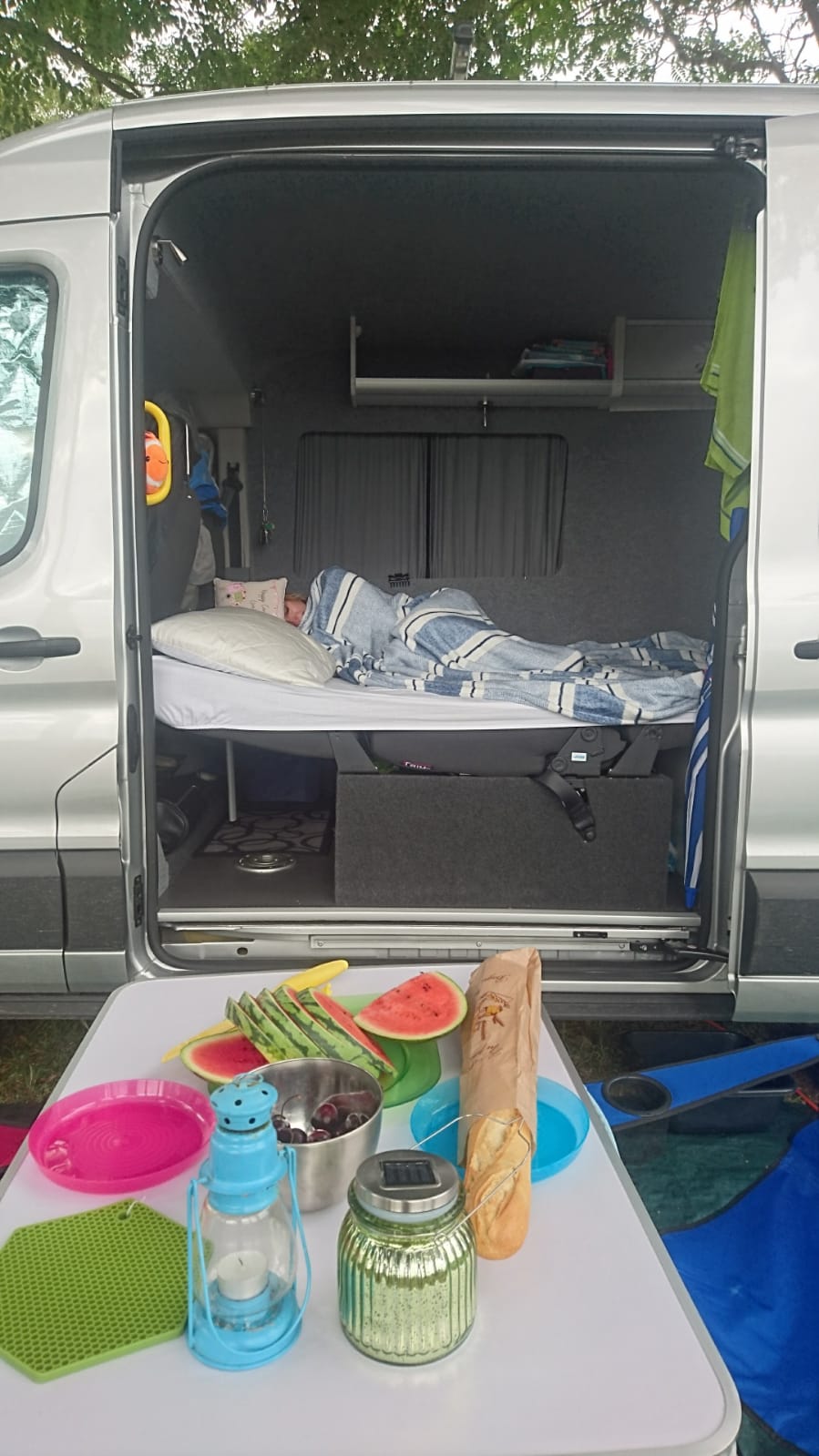
Therefore we felt that getting into a second hand vehicle of any sort would only be buying into trouble down the road, especially as my motor mechanic skills are on par with my DIY proficiency.
Changing a tyre and topping up the window-washer liquid is as far as I go.
If I was any way handy and knew the first thing about engines, carburettors, pistons and drive shafts I would definitely be on the lookout for a clean panel van with genuine mileage which to convert.
But as you can tell, I’m a great writer, not a mechanic, so we opted to buy a new van.
A rusty crock that is going to calve halfway around the Ring of Kerry
This decision was also informed by the view that there is very little point in investing in an expensive kit-out which you expect to last 20 years and putting it into a rusty crock that is going to calve halfway around the Ring of Kerry or on those steep climbs around Mayo and Donegal.
We looked at all the vans. Mercedes, VW, Fiat, Peugeot, Renault, Citroen, Nissan and they all have their merits and their fans. Personally, I think the VW Transporter is so over rated for what it offers in terms of a campervan conversion, particularly in terms of space and headroom for the price.

After months of research we eventually opted for a Ford Transit Trend H2 LWB FWD. For a while we had flirted with its smaller cousin The Transit Custom.
I have seen some good conversions of these by www.wellhouseleasure.com and others, but in the finish what passed as compact was too cramped for my liking. At the other end of the range the Ford Transit Jumbo, too big and unwieldy for cross winds and country roads.
I have this hang-up about headroom and it was a deal breaker for us to have at least 184cm headroom clearance in the main body of the vehicle once converted, taking in to account the 4cm or so you lose top and bottom once you fit the flooring and ceiling insulation.
Cost, comfort and convenience were all central to our decision and the advice of Ger Doody the head salesman at Downey’s Auto Stop in Portlaoise was equally invaluable. It was Ger who really steered us away from the Custom model and to something more mid-range in size and spec.
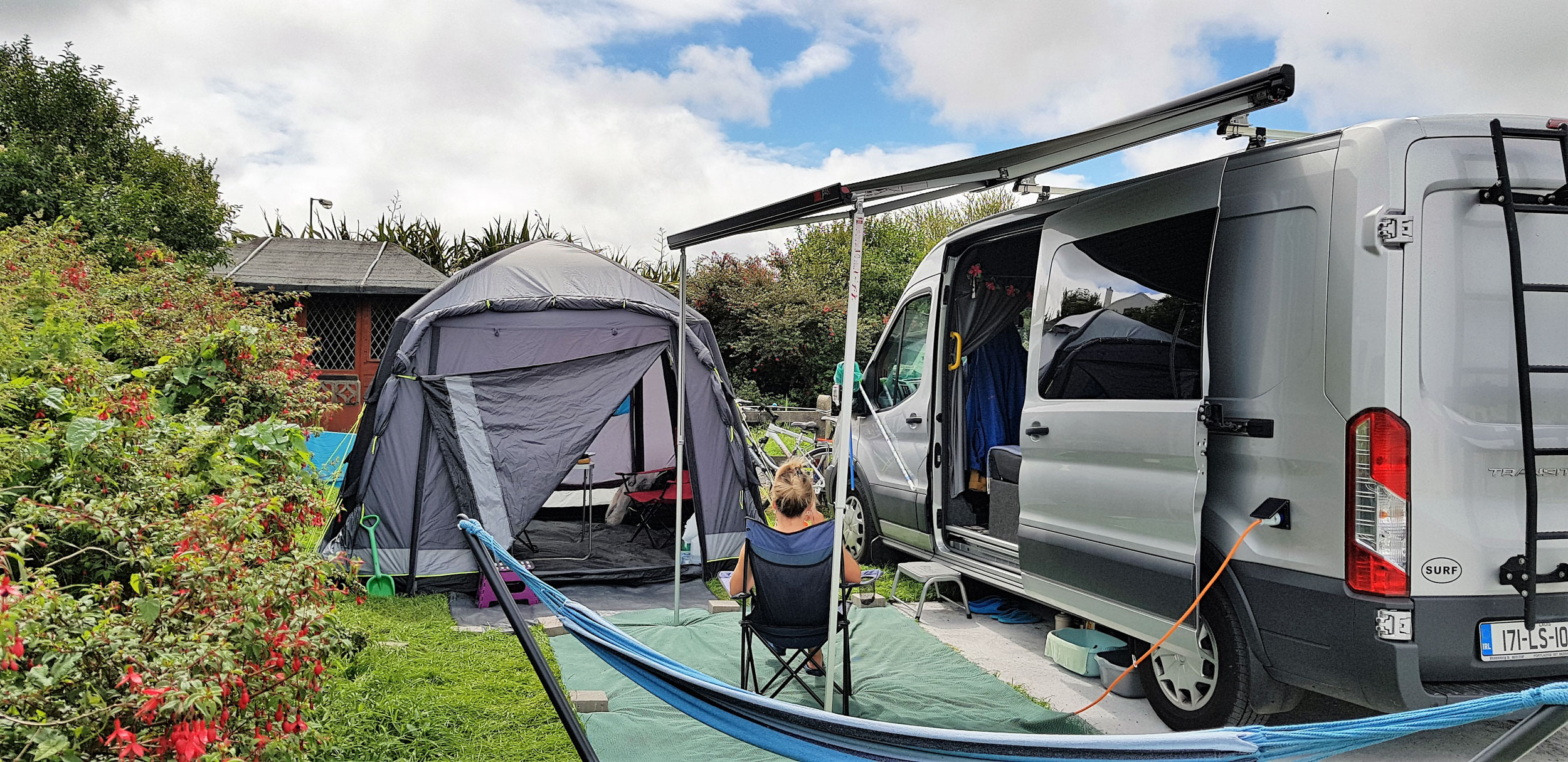
Not only does he know his motors but Ger, a keen aviation, biking and boating enthusiast brought a wealth of knowledge when it came to advising on equipment, space, light, balance and the bread and butter importance of safety, security, driveability and reliability for the long haul and the long road.
This is the all-important practical stuff and it was Ger’s tip on front wheel drive that was to give us those vital extra centimetres of headroom in the finish.
The Transit is sufficiently spacious to live in, yet compact enough and easy to park-up in a regular parking spot. It is also comfortable and convenient for us to get used to and enjoy driving either on the open road or those tight country boreens.
The current list price for the Ford Transit Trend FWD with metallic paint, air con, heated single seats is €36,450. This price is set to change in the summer as a new model is due in July.
As I leave even hanging the curtains or a picture frame in the house to Grazyna, I certainly wasn’t going to start meddling with the fit-out of a new campervan, although I do envy those DIY wizards who can tackle this kind of a project, as was my Dad, who was a great man to make and mend things. That gene seems to have skipped a generation.
The standard, precision and layout of the conversion is every bit as important as the vehicle itself.
If you stick at the camping you are going to be stuck with this campervan for life. It has to be a match made in heaven.
Again after months of research and exploring all the options we linked up with David Hanley of Vanderlust in Ennistymon in County Clare to design and deliver the conversion. You can check them out on www.vanderlust.com.
Dave and the Vanderlust team can convert anything from a bean can to a double-decker bus and everything in between. Ever since they did our van in 2017 I think they are getting even better at what they do.
People say they are pricey. Their workmanship is superb, they love what they do, and they are good at what they do. You pay for that, you get what you pay for.
Any small teething problems you just go back to them as they continue to expand their operation and turn out some really fabulous bespoke conversions, each as unique and individual as their owners.
Vanderlust also hire out campervans if you ever fancy trying it out first before you go the whole hog, which is something I strongly advise.
How much is a conversion? Well how long is a piece of string?
But I want to give as much helpful information as possible. At the Holiday Fair in January I was exploring this very issue and a Wexford company, Happy Campers, www.happycampers.ie who specialise in VW Campervan conversions were offering their Grand Tourer Plus conversion on the Transporter starting from €17k, categorising it as a 4/5 berth campervan. Their work gets rave reviews, looks well, innovative and has won several awards.
No room to swing a cat or even a Jack Russell
I think Transporter vans look great and have that slick VW chic which goes right back to the classic Combi.
However, I think neither are suitable or practical for long term camping in our climate, and are more suitable to the Pacific Coast Highway in California, where the living is easy…and outdoors.
I am not a fan of the pop-up roof and time and time again have seen people having to shut them down due to the hydrostatic in heavy rain or in strong winds.
Inside there’s not room to swing a cat, (or a Jack Russell), no room to stretch your legs and as for sleeping, well good luck with that. I need my space and these may be fine for short hop, occasional, weekend runs but not for the long-term camper.
Priceless for the travel safety and sound sleep they deliver
Last summer we encountered a German couple, travelling in a hire vehicle, a Transporter.
Once it started drizzling rain they sought refuge in our van and awning extension as there was no living space in their van, and both complained of back ache and lack of proper sleep in the fold-out seat beds, which seemed far too flimsy to me for any sort of prolonged use.
In our own case, our fit out was costed down to the last bulb and bolt.
Proper insulation is vital if you are going to survive frosty nights, headroom was vital for me and the fundamentals of a proper galley with gas hob and sink and that all important fridge. The electrics, heating and plumbing systems in a camper are intricate and the key to happy camping.
Among the extras we also opted for a 120 watt solar panel, a San Diego Freeway Drive-Away Awning, a Fiamma bike carrier, a reversing camera and Rhino roof rails and ladder to provide more living space and capacity to lug bikes, boards and boat to better enjoy the great outdoors.
However, the two most significant single items in my book were the custom made crash tested rear seats that convert into a double bed or two singles.
These are made to order in Germany and cost €2,845. They are priceless for the travel safety and sound sleep they deliver.
Equally important is our shower and toilet cabin compartment at the rear of the van.
Again, it has proved a lifesaver and not something which is possible in either the Transit Custom or VW Transporter. This for me is another deal breaker, as wild camping or urban camping is impossible without this shower and toilet facility.
To some extent once you lock in on the two passenger seats and the shower/toilet cabin the layout pretty much decides itself, as one of the drawbacks of the Transit compared to rivals in its range, which are just a little wider, is it cannot accommodate a 6ft bed width-wise. What Dave Hanley and the Vanderlust squad did teach us to appreciate is that in a campervan conversion, every centimetre is important real estate. Every inch matters.
Although I have looked on in envy at some of the Vanderlust furnishings in bamboo and earthy textiles, for our finish we opted for clean lines, slick surfaces and vinyl floor covering for durability and again ease of maintenance in our soft, salty climate by the sea.
Our fit out cost the guts of €20k. And worth every penny for the value we are getting out of the van since the spring of 2017, with 36,800km on the clock as we head in to our third season.
The hidden and hefty cost of the dreaded VRT
Apart from the van and the fit-out the third most significant and not so obvious cost of a campervan conversion is the dreaded VRT.
A hidden cost for which there is no obvious return as you have already paid your full purchase price, VAT and labour when you are hit with this cost on top before you can get motoring.
What’s more, it’s entirely out of your hands as the VRT levy is entirely set by Revenue based on their determination of the open market value of the vehicle added to the cost of the conversion at the rate of 13.3%.
So you can do the math for yourself. It’s fairly saucy and one to factor in to your budget from the outset.
It may be some small consolation that the VRT was levied at the draconian rate of 33% up until 1998 when it was reduced by 20% by then Minister for Finance, Ruairi Quinn, making him the unofficial patron saint of campervan owners ever since.
We have found Stuart Insurances Ltd www.stuartinsurances.ie just excellent to deal with and they have a special camper scheme which is underwritten by Aviva.
The cost of our annual premium is €335. The motor tax rate for campervans and motorhomes in Ireland is the lowest in Europe at €102 per annum.
The campervan designation also gives you the lower rate at toll booths in Ireland which means the difference between paying the standard rate of €1.90 instead of the commercial van rate of €3.40, which in my case is four times in the day on a surf run to Lahinch.
So that’s everything you wanted to know about getting on the road with your own campervan, which is well worth it, providing you don’t leave it parked outside the front door all year long.
You are now ready to hit the open road. And if you are interested in finding out more about campervan culture, campsite reviews, recommended road trips, the best equipment and insider camping tips then check out my Vanhalla – Camper Heaven Blog on www.vanhalla.ie
Safe journey!














